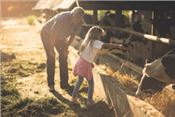Passing Down The Family Farm: A Tale Of Two Family Farms And What Happened To Them

CLINTON, MO.
True or false: For families who know the hard work involved – and the many joys – of living on a farm, no other life is acceptable. Answer?
True AND false. For the family in the first tale, the answer is false, but rings true in the second tale.
Henry's tale
Henry's parents, farmers in the Old Country, arrived in the U.S. and immediately bought land and became active members of their new farming community.
The young couple reared a large family, and, from little on, every child helped with some aspect of bringing food to the table. Fast forward. Papa wedding-gifted a parcel of land to any of his children who wanted it.
Henry accepted his dad's generous gift, intending to raise dairy cattle. He and bride Mary moved onto their land and built a home. Mary kept a large garden – and soon, an heir to the farm was born. Little Leo brought joy to his parents, until, that is, the sad day when his mother passed away. Father and son stayed on the farm.
Two years later, Henry married a young schoolteacher who attended his church. She had just one request: Please… move to the city. Farm life was not for her. The new groom agreed, bought a home in town for Lizzie and little Leo… and continued farming. And welcoming three more sons and five daughters into the family.
Thinking ahead, Henry bought more land to work now with the help of farmhands, but wanting to gift any of his children with a parcel, just as his dad had done.
There were no takers.
Except daughter Emma, who loved farming and would have accepted her dad's gift had she been able to take on those responsibilities.
Henry was left with only one choice: To sell the land to strangers.
That decision broke his heart, and Emma's.
Clarence's tale
Clarence and his sister, Meg, grew up on the 250-acre farm their dad had bought early in the twentieth century. Meg had no interest in farm life beyond her growing-up years, and headed for the nearest big city after high school graduation.
But Clarence loved the life. From season to season, he worked side-by- side with his dad planting and bringing in the harvest. Clarence pledge he would never let their farm leave the family.
Shortly before he passed away, Clarence's dad transferred ownership to Clarence.
Not long after, he married Elaine, and they reared a son and a daughter. They all loved the land.
For a time, son Michael left to pursue life as a photographer, but he would be back one day. Daughter Kathleen married and had two sons and two daughters, who all loved the farm. Kathleen was no stranger to the place where she grew up. She frequently took her young brood with her to help her mom can the fruits (and veggies) of that year's harvest.
Meanwhile, the farm kept running. In winter and spring, Clarence sold seed to farmers in the area to supplement the family income.

Years after Clarence passed away, Elaine decided the time had come to transfer ownership, with Michael and Kathleen owning equal shares.
They sat down with their attorney who detailed every part of the transfer before they each signed the papers.
They were all well-satisfied with the new arrangements --and wouldn't Clarence have been pleased? At 80, Elaine was out from under the responsibilities of farm ownership and could enjoy a little more freedom.
Michael did return to the farm, where he runs his photography business and keeps to regular planting seasons with the help of hired neighbors. He raises chickens. Since Michael is not married and has no children, he'll eventually pass ownership to Kathleen's two boys.
Do you have plans yet for passing down your family farm? Look into how we can help you, and contact us. ∆
AgriLegacy, “Keeping the Farm in the Family”, www.AgriLegacy.com